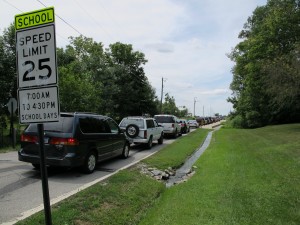Property Tax Caps Put Basic School Services On Chopping Block

Kyle Stokes/StateImpact Indiana
Cars were moving at speeds well below the school zone limit near Franklin Township Middle School East on the first day of school August 11.
The first day Franklin Township school buses were no longer free to district students was a long one for district superintendent Walter Bourke. After directing traffic in school parking lots and fielding calls from angry parents, his frustrations were apparent.
“I am angry, I lost 16 million dollars,” Bourke said. “I don’t know exactly who to blame for it. But I’m not pleased with the fact I’m the CEO of a school corporation that’s in a financial situation that we can’t serve families the way we should.”
Bourke actually has some idea who to blame, saying his district is an “unintended victim” of property tax caps, which voters added to the Indiana state constitution in November.
The limits on the percentage of property taxes a municipality can charge dried up a total of $66 million in revenue to Marion County’s 11 schools and likely hundreds of millions more from schools statewide.
- Tax Caps & Traffic Jams In Franklin TownshipBudget cuts in Franklin Township have forced families to choose: pay for student busing or provide their own ride. StateImpact Indiana’s Kyle Stokes reports on how property tax caps have now caused traffic jams outside Franklin Township schools.Download
The caps hit Franklin Township schools hard. Voters rejected the district’s request for more money in a May levy to offset losses of $16.6 million in property tax revenues. That forced the district to make deep cuts in its own transportation budget.
Now, Franklin Township families have to pay $40 to $50 per student each month to ride buses to school — either that, or provide their own transportation. On the first day, hundreds of cars spilled out of parking lots at district schools waiting to pick up students.
District officials acknowledge that remnants of boom times in the district have left a lingering perception that the district built “too fast and too lavishly,” and could be one reason a district-wide levy issue failed last May. StateImpact continues its coverage of property tax caps here.
“I would have to have a really decent job to pay $150 a month to ride the bus,” said parent Kimberley Lang while waiting in a long line of cars to pick her daughter up from Franklin Township Middle School East on the first day of school last week. She has three kids in the district.
Caps Have Statewide Impact
Franklin Township is just one of the districts that’s been slicing into its budget because of the losses in property tax money: Eastern Howard, East Allen, and Muncie schools are putting off building maintenance and other capital projects. Beech Grove City Schools officials told StateImpact they’re cutting back on floor waxings and lawn service even after voters passed a district levy to avoid massive transportation cuts.
Indiana state superintendent Tony Bennett has supported the caps since he was first campaigning for his office. He told the Indiana Economic Digest:
Many people would say that local property taxes were more stable, but one could argue that it allowed schools to budget backwards. There is no other industry where we generate revenue to meet expenses. Under the new way of budgeting, we know what the revenue is and we have to manage our expenses accordingly.
Bourke says Franklin Township has nothing left to cut but services that the property taxes once supported — like busing.
“When we have to cut services and cut programs and cut stuff, transportation has been our victim. So that’s what we’re doing. We’re balancing our budget right now, and it’s horrible,” Bourke said.
John Ellis, executive director of the Indiana Association for Public School Superintendents, said Franklin Township is on “the leading edge of those districts most severely impacted,” and fears district cuts will inevitably end up in the classroom. Ellis says when the idea of a property tax cap was first making its way through the legislature, even the most anti-tax lawmakers were leery of it.
“I talked to a lot of people, very fiscally conservative legislators, over the last several years who have said this was a mistake, but they’d have to vote for it. I think that shows there was a groundswell from the population [to pass the caps].”
Voters approved a measure to write the property tax caps into the state’s constitution with a 70 percent majority in the November 2010 elections.
Ellis said it will probably take losses in services — not only in schools, but in city services like trash collection, police, and fire — to demonstrate the full effects of the property tax caps.
“It’s kinda like what the federal government’s going through,” Ellis said. “They want to do everything through cuts and no additional revenues, and that’s not going to happen. You don’t get rid of the size of debt [school districts] have without the revenue issue.”
Podcast: Play in new window | Download
